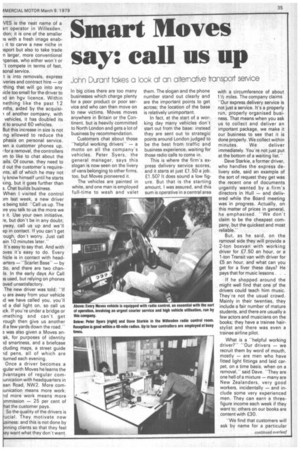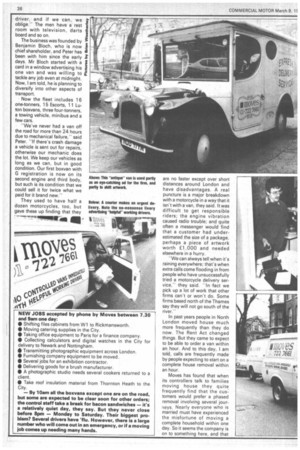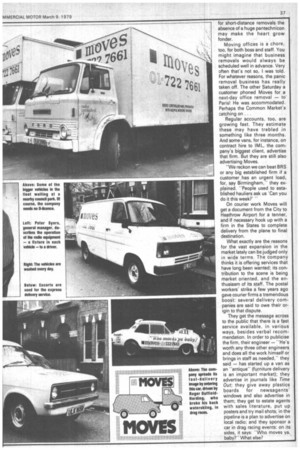mart Moves say: call us up
Page 37

Page 38

Page 39

If you've noticed an error in this article please click here to report it so we can fix it.
John Durant takes a look at an aiternafive transport service
,VES is the neat name of a 3rt operator in Willesden, don; it is one of the smaller
with a fresh image enabI it to carve a new niche in isport but also to take trade n larger, more conventional elpanies, who either won't or 't compete in terms of fast, sonal service.
t is into removals, express iveries and contract hire — or /thing that will go into any tide too small for the driver to .311 an hgv licence. Within nething like the past 12 nths, aided by the acquisii of another company, with vehicles, it has doubled its .3t to around 60 vehicles.
But this increase in size is not ing allowed to reduce the phasis on personal service. len a customer phones up, 'for a removal, the controllers )m to like to chat about the tails. Of course, they need to d out the customer's requi reints, all of which he may not ly know himself until he starts king, but it goes further than s. Chat builds business.
When I visited the control )m last week, a new driver is being told: "Call us up. The )re you talk to us the more we
e it. Use your own initiative, re, but don't be in any doubt; yway, call us up and we'll ep in contact. If you can't get -ough, don't worry. Just call am n 10 minutes later.'
It's easy to say that. And with oyes it's easy to do. Every hide is in contact with head
larters — -Scarlet Base— by iio, and there are two chan
Is. In the early days Air Call 3s used, but relying on phones oved unsatisfactory.
The new driver was told: "If lu are away from your vehicle id we have called you, you'll id a dial light on, so call us wk. If you're under a bridge or imething and can't get rough then give us another ill a few yards down the road."
• was also given a Moves an ak, for purposes of identity Id smartness, and a briefcase eluding maps, a street guide id pens, all of which are !turned each evening.
Once a driver becomes a igular with Moves he learns the dvantages of regular corniunication with headquarters in ean Road, NW2. More cornunication means more work: id more work means more immission — 25 per cent of hat the customer pays.
So the quality of the drivers is -ucial. They motivate new usiness: and this is not done by pnning clients so that they feel ley want what they don't want. In big cities there are too many businesses which charge plenty for a poor product or poor service and who can then move on to new victims. Moves moves anywhere in Britain or the Continent, but is heavily committed to North London and gets a lot of business by recommendation.
Customers chat about those "helpful working drivers— a motto on all the company's vehicles. Peter Syers, the general manager, says this slogan is now seen on the livery of vans belonging to other firms, too, but Moves pioneered it.
The vehicles are painted in white, and one man is employed full-time to wash and valet them. The slogan and the phone number stand out clearly and are the important points to get across; the location of the base is relatively unimportant.
In fact, at the start of a working day many vehicles don't start out from the base: instead they are sent out to strategic points around London judged to be the best from traffic and business experience, waiting for those radio calls to come in.
This is where the firm's express delivery service scores, and it starts at just £1 .50 a job. £1.50? It does sound a low figure. But that is the starting amount, I was assured, and this sum is operative in a central area
with a circumference of about 11/2 miles. The company claims "Our express delivery service is not just a service. It's a properly run, properly organised business. That means when you ask us to collect and deliver an important package, we make it our business to see that it is done properly. We collect within
minutes. We deliver immediately. You're not just put at the bottom of a waiting list."
Dave Starkie, a former driver, who handles the express delivery side, said an example of the sort of request they get was the recent one of documents urgently wanted by a firm's directors in Hull — and delivered while the Board meeting was in progress. Actually, on this matter of prices in general, he emphasised. "We don't claim to be the cheapest company, but the quickest and most reliable."
But, as he said, on the removal side they will provide a 2-ton boxvan with working driver for £7.50 an hour, or a 1-ton Transit van with driver for £5 an hour, and what can you get for a fiver these days? He pays that for music lessons . . .
If he shopped around the might well find that one of the drivers could teach him music. They're not the usual crowd. Mainly in their twenties, they include a fair number of mature students, and there are usually a few actors and musicians on the books; they have a trainee hairstylist and there was even a trainee airline pilot.
What is a "helpful working driver?" "Our drivers — we recruit them by word of mouth, mostly — are men who have fitted light fittings and laid carpet, on a time basis, when on a removal," said Dave. "They are one hell of a mixture — many are New Zealanders, very good workers, incidentally — and include some very experienced men. They can earn a threefigure income each week if they want to; others on our books are content with £30,
"We find that customers will ask by name for a particular continued overleaf
driver, and if we can, we oblige." The men have a rest room with television, darts board and so on.
The business was founded by Benjamin Bloch, who is now chief shareholder, and Peter has been with him since the early days. Mr Bloch started with a card in a window advertising his one van and was willing to tackle any job even at midnight. Now, I am told, he is planning to diversify into other aspects of transport.
Now the fleet includes 16 one-tonners, 15 Escorts, 11 Lu ton boxvans, three four-tonners, a towing vehicle, minibus and a few cars.
"We've never had a van off the road for more than 24 hours due to mechanical failure,'" said Peter. "If there's crash damage a vehicle is sent out for repairs, otherwise our mechanic does the lot. We keep our vehicles as long as we can, but in good condition. Our first boxvan with G registration is now on its second engine and third body, but such is its condition that we could sell it for twice what we paid for it brand new."
They used to have half a dozen motorcycles, too, but gave these up finding that they are no faster except over short distances around London and have disadvantages. A real puncture is a major breakdown with a motorcycle in a way that it isn't with a van, they said. It was difficult to get responsible riders; the engine vibration caused radio trouble; and quite often a messenger would find that a customer had underestimated the size of a package, perhaps a piece of artwork worth £1,000 and needed elsewhere in a hurry.
"We can always tell when it's raining everywhere: that's when extra calls come flooding in from people who have unsuccessfully tried a motorcycle delivery service,they said. -In fact we pick up a lot of work that other firms can't or won't do. Some firms based north of the Thames say they will not go south of the river."
In past years people in North London moved house much more frequently than they do now. The Rent Act changed things. But they came to expect to be able to order a van within an hour. And to this day, I am told, calls are frequently made by people expecting to start on a complete house removal within an hour.
Moves has found that when its controllers talk to families moving house they quite frequently find that the customers would prefer a phased removal involving several jourqeys. Nearly everyone who is married must have experienced the misfortune of moving a complete household within one day. So it seems the company is on to something here, and that for short-distance removals the absence of a huge pantechnicon may make the heart grow fonder.
Moving offices is a chore, too, for both boss and staff. You might imagine that business removals would always be scheduled well in advance. Very often that's not so, I was told. For whatever reasons, the panic removal business has really taken off. The other Saturday a customer phoned Moves for a next-day office removal — to Paris! He was accommodated. Perhaps the Common Market's 7,atching on .. .
Regular accounts, too, are growing fast. They estimate these may have trebled in something like three months. And some vans, for instance, on contract hire to IML, the company's biggest client, advertise that firm. But they are still also advertising Moves.
"We reckon we can beat BRS or any big established firm if a customer has an urgent load, for, say Birmingham," they explained. "People used to established hauliers ask us 'Can you do it this week?'
On courier work Moves will get a document from the City to Heathrow Airport for a tenner, and if necessary hook up with a firm in the States to complete delivery from the plane to final destination.
What exactly are the reasons for the vast expansion in the market lately can be judged only in wide terms. The company thinks it is offering services that have long been wanted; its contribution to the scene is being market oriented, and the enthusiasm of its staff. The postal workers' strike a few years ago gave courier firms a tremendous boost: several delivery companies are said to owe their origin to that dispute.
They get the message across to the public that there is a fast service available, in various ways, besides verbal recommendation. In order to publicise the firm, their engineer — "He's worth any three other engineers and does all the work himself or brings in staff as needed," they said — has started up a van as an "antique" (furniture delivery is an important market); they advertise in journals like Time Out; they give away plastics boards for newsagents' windows and also advertise in them; they get to estate agents with sales literature, put up posters and try mail shots; in the pipeline is a plan to advertise on local radio; and they sponsor a car in drag racing events: on its sides, it says: "Who moves ya, baby?" What else?












































































































